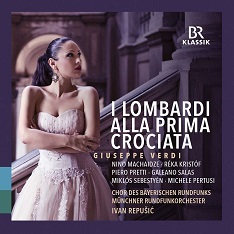Die Verdi-Oper ‘I Lombardi alla prima crociata’ nach einem Libretto von Temistocle Solera wurde 1843 komponiert. Es ist Verdis vierte Oper; sie entstand gut drei Jahre nach seiner ersten Oper Oberto und ein Jahr nach Nabucco. Die Handlung, ein Familienkonflikt mit Bruderstreit samt Vatermord ist selbst für italienische Opern recht konfus.
Pagano, der Sohn von Lord Folco, wurde von Viclinda, der Frau, die er liebt, wegen seines Bruders Arvino zurückgewiesen. Pagano plant, seinen Bruder zu töten, aber sein Vater wird stattdessen ermordet.
Giselda, die Tochter von Arvino, wurde von dem Muslim Acciano gefangen genommen und wird in seinem Harem gefangen gehalten, wo sich Accianos Sohn Oronte in sie verliebt hat. Arvino führt eine Gruppe von Kreuzrittern an, um sie zu retten, doch zu seinem Entsetzen wendet sich Giselda gegen ihn, weil er ihre muslimischen Entführer blutig geschlagen hat.
Oronte wird verwundet, doch ein mysteriöser Einsiedler führt ihn auf dem Sterbebett zu einer erlösenden christlichen Konversion. Schließlich entpuppt sich der Einsiedler als der reuige Pagano, der selbst tödlich verwundet wird und stirbt, während Arvino und Giselda ihm vergeben und die siegreichen Kreuzfahrer die Tore Jerusalems erreichen.
Die Münchner Besetzung ist hervorragend. Nino Machaidze ist als Giselda zu hören. Die Sopranistin singt die dramatische Koloraturpartie ausgezeichnet. Michele Pertusi singt den Pagano stimmlich gut und darstellerisch sehr glaubwürdig.
Galeano Salas überzeugt in der Rolle des Arvino mit einer schönen und lyrischen Stimme. Piero Pritti ist guter Oronte.
Da diese Oper dem Chor eine große Präsenz einräumt, ist der Chor des Bayerischen Rundfunks ein wichtiger Akteur und begeistert mit tadellosem Gesang.
Ivan Repusic, lässt das Münchner Rundfunkorchester kraftvoll aufspielen und bringt Verdis Musik richtig in Schwung.
The Verdi opera ‘I Lombardi alla prima crociata’ to a libretto by Temistocle Solera was composed in 1843. It is Verdi’s fourth opera; it was written a good three years after his first opera Oberto and one year after Nabucco. The plot, a family conflict with fraternal strife including patricide, is extremely confused even by Italian operatic standards.
Pagano, Lord Folco’s son, has been rejected by Viclinda, the woman he loves, because of his brother Arvino. Pagano plans to kill his brother, but his father is murdered instead.
Giselda, Arvino’s daughter, has been captured by the Muslim Acciano and is held captive in his harem, where Acciano’s son Oronte has fallen in love with her. Arvino leads a group of crusaders to rescue her, but to his horror, Giselda turns on him for bloodily beating her Muslim captors.
Oronte is wounded, but a mysterious hermit leads him to a redemptive Christian conversion on his deathbed. Eventually the hermit turns out to be the repentant Pagano, who himself is mortally wounded and dies, while Arvino and Giselda forgive him and the victorious crusaders reach the gates of Jerusalem.
The Munich cast is excellent. Nino Machaidze is heard as Giselda. The soprano sings the dramatic coloratura role excellently. Michele Pertusi sings Pagano well vocally and very credibly in terms of acting.
Galeano Salas is convincing in the role of Arvino with a beautiful and lyrical voice. Piero Pritti is good Oronte.
Since this opera gives a great presence to the chorus, the Bavarian Radio Chorus is an important player and inspires with impeccable singing.
Ivan Repusic, has the Munich Radio Orchestra playing powerfully and really gets Verdi’s music going.




















